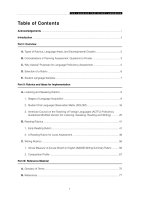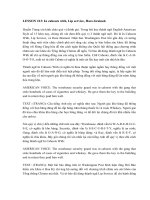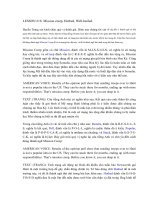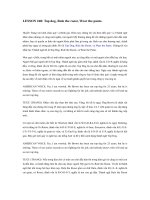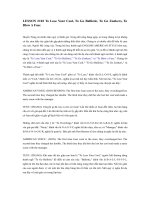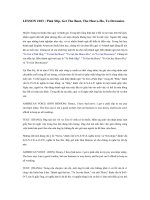Tài liệu Vocabulary Language workbook pdf
Bạn đang xem bản rút gọn của tài liệu. Xem và tải ngay bản đầy đủ của tài liệu tại đây (1.16 MB, 102 trang )
VOCABULARY
IN THE SAME SERIES
Editor: Richard Hudson
Patricia Ashby Speech Sounds
Edward Carney English Spelling
Jonathan Culpeper History of English
Nigel Fabb Sentence Structure
John Haynes Style
Richard Hudson Word Meaning
Richard Hudson English Grammar
Jean Stilwell Peccei Child Language
Raphael Salkie Text and Discourse Analysis
R. L. Trask Language Change
Peter Trudgill Dialects
VOCABULARY
Laurie Bauer
London and New York
First published 1998
by Routledge
11 New Fetter Lane, London EC4P 4EE
Simultaneously published in the USA and Canada
by Routledge
29 West 35th Street, New York, NY 10001
This edition published in the Taylor & Francis e-Library, 2001.
© 1998 Laurie Bauer
All rights reserved. No part of this book may be reprinted or reproduced or utilized
in any form or by any electronic, mechanical, or other means, now known or
hereafter invented, including photocopying and recording, or in any information
storage or retrieval system, without permission in writing from the publishers.
British Library Cataloguing in Publication Data
A catalogue record for this book is available from the British Library
Library of Congress Cataloguing in Publication Data
Bauer, Laurie, 1949–
Vocabulary / Laurie Bauer.
p. cm – (Language workbooks)
ISBN 0–415–16398–6 (pbk.)
1. Vocabulary–Problems, exercises, etc. I. Title. II. Series.
PE1449.B348 1998
428.1–dc21
97-39921 CIP
ISBN 0–415–16398–6
ISBN 0-203-02605-5 Master e-book ISBN
ISBN 0-203-17367-8 (Glassbook Format)
For Keith and Ingrid
VII
CONTENTS
Using this book viii
Acknowledgements x
1 The magic of words 1
2 Vocabulary statistics 7
3 Borrowing 14
4 New words from English 1: compounds 19
5 New words from English 2: derivatives 25
6 Meaning relationships 30
7 Formal relationships 36
8 Stylish words 41
9 Technical words 46
10 Where words come from: etymology 50
11 Words that change their meanings 56
12 Dictionaries 62
13 Where next? 69
Answers to exercises 71
Index 87
VIII
USING THIS BOOK
Vocabulary is about words – where they come from, how they change, how
they relate to each other and how we use them to view the world. You have
been using words since before your second birthday to understand the wishes
of others and to make your own wishes and feelings known. Here you will be
asked to consider words in an objective manner – while remembering that
objectivity should not exclude a certain amount of entertainment.
Chapters 1 and 2 provide some general background on the power and
mystique of words and on the numbers of words we deal with in our everyday
lives. One of the things about words is that we keep meeting new ones: as
society changes we gain new words like download or AIDS and lose old ones
like barouche or reefer. In Chapters 3, 4 and 5 we ask where the new words
come from. Chapters 6 and 7 view words from two complementary angles:
their meaning and their shape (shape being either their sound-shape or their
spelling-shape). In Chapters 8 and 9 we go on to see how different words are
used in different contexts and to try to work out the meanings of some of the
very technical words we find in English. In Chapters 10 and 11 we look at the
origins of words and how words change their meanings. And in Chapter 12 we
take a brief look at dictionaries, the ultimate word-books.
All of this is an attempt to give you some kind of over-view of the fascination
of words. But in a book of this size, it must be recognised that not everything
can be covered. Some of the points which are not fully discussed in this book
are covered – or are covered in more detail – in other books in the same series.
Richard Hudson’s book on Word Meaning and Richard Coates’s on Word
Structure deal in much more detail with things which are mentioned here, but
about which a great deal more might be said. I do not here look at words as
markers of regional identity (where does someone who calls a young cat a
kittling come from?), at place names or personal names, at the skills required
IX
USING THIS BOOK
for word-games, or at the ways in which words are stored in the brain ready to
be used at a moment’s notice. Perhaps when you have read this book, you will
be ready with a host of such questions to answer in further study.
X
ACKNOWLEDGEMENTS
I should like to thank Dick Hudson, the series editor, for his help in bringing
this book into being, the Routledge team for their technical expertise, including
that of their student reader, and my family for support. Especially I should like
to thank Keith for being a guinea-pig, and Winifred for her much-appreciated
and invaluable assistance.
The author and publishers would also like to thank the following for permission
to reproduce copyright material:
The extract from The International Express article on page 2 is reprinted
courtesy of Express Newspapers Plc.
The Evening Post article on page 3 is reprinted with kind permission of
Wellington Newspapers Ltd.
‘Ode to the Four-letter word’, by Ogden Nash on page 3, © Estate of Ogden
Nash, is reprinted by permission of Curtis Brown Ltd.
The article on page 5 is published with the permission of The National Business
Review.
The article on page 20, © The Australian 1997 is reprinted with kind permission
of The Australian.
The extract from Fox in Socks by Dr. Seuss on page 22,
TM
and copyright ©
1965 and renewed 1993 by Dr. Seuss Enterprises, L.P., is reprinted by permission
of Random House Inc and Dr. Seuss Enterprises.
Extract from ‘Life in the deep freeze’ on page 45, © Time Magazine 1997, is
reprinted with permission of Time Life Syndication.
The extract from The Macquarie Concise Dictionary, 2nd edn., 1988, on page
63, is reprinted by permission of the The Macquarie Library Pty Ltd.
The extract from The Oxford Concise Dictionary, 9th edn., 1989 on page 64,
and the definitions on page 66 are reprinted by permission of The Oxford
University Press.
The extract from Merriam-Webster’s Collegiate® Dictionary, 10th edn. on
page 65, and definition on page 30, © 1996 by Merriam-Webster, Incorporated
is reprinted by permission of the copyright holders.
Some material previously used in Laurie Bauer’s Perspectives of Words (1984)
is reprinted here by kind permission of Victoria University of Wellington.
While the author and publishers have made every effort to contact copyright
holders of material used in this volume, they would be grateful to hear from
any they were unable to contact.
1
THE MAGIC OF WORDS
In this chapter we look at the power of words. In particular we consider
cases where words are thought of as being so powerful that they may not
be uttered without fear of sanction.
There is a large amount of evidence which shows that people believe words to
have magic powers. This is most easily illustrated with those very special
words, people’s names. In the traditions of modern Ethiopia, the real name of
a child is concealed in case the child is bewitched through the use of the
name. It is believed that knowledge of the name gives power over the person
who bears that name. Beliefs of this type are widespread throughout the
world. In Borneo, for example, the name of a sickly child is traditionally changed
so that the spirits tormenting it will be deceived and leave the child alone. The
spirits, apparently, can recognise people only by their names, not through
other characteristics. An extreme example was reported by the early explorers
in the Marquesas Islands. There it was possible for two people to exchange
names as a sign of mutual respect. But this exchange of names also involved
an exchange of responsibilities: obligations with respect to the family, friends
and even enemies went with the change of name. A man might even be expected
to go to war because of the responsibility to his new name.
In some cultures, the use of a particular name is an offence. In imperial
China, for instance, it was a crime to use the name of a reigning emperor. This
could provide problems when the emperor’s name was also a common word. If
this occurred in an English-speaking country today where the emperor’s name
was Bill, it would be illegal to talk about a bill from the electricity company, a
bill before parliament or the bill of a bird. Similar prohibitions are found among
the Zulus: there a woman is not allowed to utter the name of her husband or
the names of his parents.
1
2
THE MAGIC OF WORDS
1.1 Can you think of any names that we are not supposed to mention or not
supposed to mention outside certain specific contexts in any parts of the
English-speaking world?
Similar kinds of constraints can apply to the names of things, as well as to the
names of people. It is fairly common to find a taboo against the use of the
name of a powerful animal such as a bear, tiger or crocodile. Instead phrases
like ‘honey-eater’ or nick-names like ‘Bruin’ are used. In parts of Africa and
India it is not done to name a snake. Instead you say things like ‘There is a
strap’ or ‘There is a rope.’ It is believed that if you call something a snake it is
likely to act like a snake, and bite you. In a similar vein, Bavarian farmers in
Germany traditionally do not name the fox, in case using the word calls the fox,
and causes it to attack their hens. In a very similar vein, we still say ‘Talk of the
devil’, suggesting that speaking of someone causes them to appear. Finally,
and more subtly, it used to be the case in China that a doctor who did not have
the appropriate drug for his patient would write the name of the drug on a
piece of paper, burn it, and get the patient to eat the ashes. It was believed that
the name of the drug would be just as efficient as the drug itself.
One theory about the origin of these beliefs is that the magic of names is
established as children learn language. As soon as small children learn the
names for things, they can use those names and the item they name will
appear – usually because some kind adult or older brother or sister fetches it.
The link between saying the word and the appearance of the thing is a very
strong one. Knowing the word is equivalent to having power over the object.
From our vantage point in twentieth-century ‘civilised’ society, we tend to
be rather patronising about such irrational beliefs about names and words.
We feel that we, as rational people, are not prone to them. We feel we know
better. In fact nothing could be further from the truth. Innumerable instances
can be found where people act as though the name of a thing has power
equivalent to that thing.
1.2 Consider the following extract from an item that appeared in The
International Express for 12–18 June 1996.
Bosses have more than fifty ways of saying it, apparently, but they
never use the word ‘sack’. Rationalisation, re-engineering and
organisational realignment are among euphemisms used, according
to a union survey.
Some workers soon to be jobless have been told: ‘You’ve made
yourself redundant’, or ‘This will get you out of a rut.’
How does this illustrate the power of the word?
EXERCISE
EXERCISE
3
THE MAGIC OF WORDS
The example cited in 1.2 raises another aspect of the magic of words. There are
some words which are too forceful to be used in polite society. This is
particularly the case, in English, for words denoting bodily functions. To a
certain extent this is because the word reminds us too strongly of the action,
and just as the action is not a public one, so too it is felt that the words should
not be.
1.3 What makes people treat the words for private actions as private?
However, this is not the whole story, because if there are a number of words
denoting the same thing, it is often possible to use some of them without
causing offence (or at least, without causing as much offence). For example,
small children can pee, piddle or do a wee-wee, and use the words in public
without shocking anyone but the most prudish. In the hospital it is perfectly
possible to speak of urination and micturition without giving offence. In
informal contexts it is permissible to mention the need to spend a penny or see
a man about a dog without risk of being thought coarse. But the contexts in
which the word piss can be used are extremely limited. This prompted Ogden
Nash to write:
Ode to the Four-Letter Word
When in calling, plain speaking is out;
When the ladies (God bless ’em) are milling about,
You may wet, make water or empty the glass;
You can powder your nose, or the ‘johnny’ will pass.
It’s a drain for the lily, or man about dog
When everyone’s drunk, it’s condensing the fog;
But sure as the devil, that word with a hiss
It’s only in Shakespeare that characters - - - -.
An article showing the force of another common English word appeared in
the Wellington newspaper The Evening Post on 20 December 1982. Part of
that item is reproduced here:
A complaint against the New Zealand Times of using obscene
language has been dismissed by the Press Council.
A Lower Hutt reader, Mr L. D. Leitch, complained to the council
about the use of a word, ‘a fairly widely used vulgarism for copulation’,
according to the council, in the paper’s Bookworld column on
September 5.
The word appeared in a poem in an anthology of New Zealand
verse reviewed by Michael King.
Mr Leitch expressed dismay and disgust and asked the New
Zealand Times to apologise.
The paper’s editor, Bob Fox, said the word was used in context
EXERCISE
4
THE MAGIC OF WORDS
where a qualified reviewer was discussing the latest addition to
New Zealand literature.
He said he would not have used it on the front page, but the
word [appeared in] part of an arts page column, unadvertised, and
was in context.
It was not used in a prurient sense and was published after deep
consideration in a newspaper which sought to cover literature with
due seriousness.
The fact that the ‘widely used vulgarism for copulation’ is not used in the
article reporting the case is just one of the things showing how powerful the
magic associated with the word is. Others are the comment that it would not
have been used on the front page, and that even so it was only published
‘after deep consideration’. It is unlikely that there are many readers – if any –
who have not heard the word fuck, which is presumably the ‘vulgarism for
copulation’ in question. Neither does it seem that it is the naming of the act
that is found distasteful, since the word copulation is used quite freely. Fuck
is almost certainly a more common word than copulate, but because of the
superstitious awe with which the word is viewed, papers cannot print it.
Examples like this show clearly the power that some words have.
1.4 The example of fuck shows that the magic is connected with particular
words rather than with the meaning of the word. Below are listed some
concepts, for which you can probably think of a number of words. What
synonyms can you find, and when would you use them? (You might like to
consider what you would say in a court of law, to a doctor, in class, to your
parents, to your friends.)
to be intoxicated
to evacuate the bowels
to pass wind
to die
1.5 We also show how powerful words are by using them to ward off ill luck.
While many of these words indicate actions (like touch wood, for example), it
is possible to use the words without the actions. What other examples of this
behaviour can you find?
Perhaps one of the examples from the Christian tradition that most strongly
indicates the power of words is the first line of the Gospel According to St
John, where it is said that
In the beginning was the Word, and the Word was with
God and the Word was God.
EXERCISE
5
THE MAGIC OF WORDS
However this is to be interpreted, it appears to be attributing divine
characteristics to the word.
In all the examples that have been considered in this chapter it has been
shown that words have a power of their own. This power might be considered
magical in some cases. In other cases we might merely say that a person who
can harness that power is talented or skilful. But even in our technological
society, words continue to exert a very potent force on us. That is part of their
fascination.
1.6 The following article appeared on page 6 of the New Zealand National
Business Review number 519, for 21 March 1983. How does this article relate
to what has been said in this chapter on the magic of words? What is your
reaction to the facts in the article?
FYI, verboten
The Broadcasting Corporation last year handed down to its
employees a stern list of words they were not allowed to utter on
the air. But have you ever wondered what you’re not allowed to say
on a motor vehicle registration plate?
Two letters on a car plate don’t give much opportunity for
unfortunate combinations; but with the three letter sequence on
motorcycles, you have to be a bit more careful.
A copy of the tender for the manufacture of plates has drifted
into our hands, and the document spells it out.
Single plates for motorcycles should run DPA through to QYK
‘excluding the respective series FUC, FUK, FUX, FUZ (we have
to remember that police and traffic officers will be riding a lot of
these bikes), GOD, GUT, KOK, LOO, PEE, PIG (sensitive cops
again), PIS, PIZ, POO (that’s surely getting a bit too sensitive)
and POX.’
We think they’ve trapped anything that could possibly raise a
blush on a meter maiden’s (or traffic officer’s) cheek. But if you
do think of one that’s been missed, don’t tell us, tell the Post
Office.
The examples of the magic of names in other cultures are taken from M. Leach
(ed.), Funk and Wagnalls Standard Dictionary of Folklore, Mythology and
Legend (New York: Funk and Wagnalls, 1972), B. Malinowski, Coral Gardens
and their Magic (New York, etc.: American Book Company, 1935), E. B. Tylor,
Researches into the Early History of Mankind and the Development of
Civilization (Chicago and London: Chicago University Press, 1964. Revised
and edited from the 1878 edition), and R. W. Williamson, The Social and
FOLLOW-UP
READING
EXERCISE
6
THE MAGIC OF WORDS
Political Systems of Central Polynesia (Cambridge: Cambridge University
Press, 1924). Of these, the Malinowski book, while very much more specific
than the others, discusses the magic of words in an interesting way.
7
VOCABULARY
STATISTICS
In this chapter we consider some facts and figures about words, and why
it is so difficult to be precise about these numbers.
How many words do you know? How many words did Shakespeare know?
How many words are there in English, and how fast are we getting new ones?
These look like straightforward questions. When you realise that estimates
of how many words an individual is likely to know vary between 3,000 and
216,000, it becomes clear that getting a satisfactory answer is not as
straightforward as you might think. We need to think about why we should
get such widely differing answers. Let’s start with some of Shakespeare’s
words.
Look at the passage below, and decide how many words Shakespeare used
to write this passage from The Tempest (V.i.88).
Where the bee sucks, there suck I
In a cowslip’s bell I lie.
2.1 How many words do you think there are in this couplet?
You probably said that there are thirteen words in these two lines of
Shakespeare’s. However, you might have been a bit more precise and said that
there are only twelve different words, because the word I occurs twice. But
now think about the words suck and sucks. Do you want to say that because
Shakespeare wrote these two different forms, it proves he knew two words?
Or would you rather say that suck and sucks are, in some sense, the same
word?
2
EXERCISE
8
VOCABULARY STATISTICS
The difficulty here is a terminological one. It seems contradictory to say both
‘Suck and sucks are two different words’ and ‘Suck and sucks are the same
word.’ The apparent contradiction arises because we are using the word word
in two different ways. With a bit of technical jargon we can solve the problem.
We can say that suck and sucks are two different
WORD-FORMS
representing
just one
LEXEME.
Sucking and sucked are other word-forms which also stand
for the lexeme
SUCK
.
Now let us return to Shakespeare. When we ask how many words
Shakespeare knew, are we interested in word-forms or lexemes? You will
probably agree that we are more interested in lexemes. Yet the figures that are
usually cited for Shakespeare’s vocabulary, which credit him with knowing (or
at least, having used – he probably knew a lot more, and seems to have
invented a few!) about 30,000 different words, count word-forms rather than
lexemes. If we counted lexemes, the result would be under 20,000.
2.2 Do any of the lexemes listed below have more word-forms than the
lexeme
GO
? Do any of them have only one word-form?
BE, CAT, CATCH, HAVE,
IMPORTANT, MANY.
This is not the only problem we face in counting words. Consider the word lie
in the couplet from The Tempest. The same form occurs in each of the following
sentences, but you might not think that they are all the same lexeme:
(1) If I tell thee a lie, spit in my face (Henry IV Pt 1, II.iv)
(2) Who loves to lie with me? (As You Like It, II.v)
(3) I dare [. . .] spit upon him, whilst I say he lies (Richard
II, IV.i)
If we look only at the form, we will not necessarily be able to tell how many
lexemes are involved.
2.3 Can you see any reasons why we might want to say there is more than
one lexeme LIE occurring in (1)–(3)?
Perhaps a bigger problem than all of these is how to treat compound words
like school-boy. Some writers use a hyphen in such words, others use no
space at all, others write them as two words. Not even English dictionaries can
agree on how to write this and hundreds of other words like it. If we are making
a list of English lexemes and we count school-boy simply as
SCHOOL
and
BOY
we find two lexemes. But if we treat it as a new lexeme, perhaps writing it
Word-form
Lexeme
EXERCISE
EXERCISE
9
VOCABULARY STATISTICS
solid as schoolboy, we have the lexemes
SCHOOL
and
BOY
and the lexeme
SCHOOLBOY
as well. Counting compounds as new lexemes will mean that we
end up with a much higher estimate of how many lexemes ordinary people
know.
2.4 What is the smallest number of words and the largest number of words
you could claim were illustrated in the following passage from Love’s Labour’s
Lost IV.iii?
They have pitch’d a toil: I am toiling in a pitch – pitch that defiles.
Defile! A foul word. Well, ‘set thee down sorrow!’ for so they say the
fool said, and so say I, and I am the fool. Well proved, wit. [. . .] O,
but her eye! By this light, but for her eye, I would not love her – yes
for her two eyes. Well, I do nothing in the world but lie, and lie in
my throat. By heaven, I do love; and it hath taught me to rhyme,
and to be melancholy; and here is part of my rhyme, and here my
melancholy.
With all these problems – and a host of others that we have not considered –
it is perhaps not surprising that it is very difficult to give an estimate of how
many words people know. Even if we set out to test how many words you
know, all the same problems would arise: how many different lexemes
LIE
do
you know? should we count schoolboy as a new word? how many words do
suck and sucks represent? should we count words not in dictionaries – such
as names – as words?
Despite all this, there have been various attempts to test people’s vocabulary
to see how many words they know. These tests are usually done on the basis
of dictionaries. If you read the blurbs on the dust jacket of several dictionaries
in a book shop, they will probably tell you how many words they contain.
What they will not tell you is how they counted. It’s usually a fair bet that they
have over-estimated to make the dictionary look as good as possible. But
many tests have been made up, taking into account factors such as how
frequently you are likely to have met certain words in texts, the numbers of
words in dictionaries, and other factors. One such test is reproduced below.
2.5 Read through the list of words below, putting a tick next to words you
know (words you could give a meaning for) and a question mark next to words
you are not sure about. When you’ve been right through the list, go back and
check the words you have marked with a question mark, to see if you can
change them to ticks. Lookat the five words with the highest numbers that
EXERCISE
EXERCISE
10
VOCABULARY STATISTICS
you have ticked. Provide a synonym or definition of those five words, or
show you know their meanings in some other way. Then check those meanings
in a dictionary. (NB: You will need a very big dictionary for some of these
words, or you may have to check in several dictionaries!) If you get more than
one wrong, you need to go backwards through the list, repeating the procedure,
until you can explain correctly four out of the five highest-numbered words
with ticks. Count the words from the list that you have ticked up to the last
correct tick, and multiply that number by 500.
1 as 11 abstract 21 aviary
2 dog 12 eccentric 22 chasuble
3 editor 13 receptacle 23 ferrule
4 shake 14 armadillo 24 liven
5 pony 15 boost 25 parallelogram
6 immense 16 commissary 26 punkah
7 butler 17 gentian 27 amice
8 mare 18 lotus 28 chiton
9 denounce 19 squeamish 29 roughy
10 borough 20 waffle 30 barf
31 comeuppance 41 cupreous
32 downer 42 cutability
33 geisha 43 regurge
34 logistics 44 lifemanship
35 panache 45 atropia
36 setout 46 sporophore
37 cervicovaginal 47 hypomagnesia
38 abruption 48 cowsucker
39 kohl 49 oleaginous
40 acephalia 50 migrationist
The number you get when you try exercise 2.5 will give you an estimate of the
size of your vocabulary in line with the latest theoretical positions. But be
careful with the figure! Do not try to compare your figure derived from this
test with that provided by other people by other means. The number this test
provides will be much lower than numbers provided by many other ways of
estimating vocabulary size. Remember, too, that ideally you should do several
such tests, and take an average of the results. And above all, remember that
this test, like others, makes its own judgements about the kinds of question
we have raised earlier.
Note that this test assumes that whoever you are, you will not have a
vocabulary of more than 25,000 words. Only the most widely-read people will
have a vocabulary even approaching that. If you ever get that far, you are
unlikely to get there before your twenties, let’s say twenty-two at the earliest.
At the age of one and a half, the chances are that you knew under 300 words.
11
VOCABULARY STATISTICS
A little arithmetic will tell you how many words you have to learn per year to
achieve that total, and you can work out what that means in terms of words
per day. To make the arithmetic simple, say that at one and a half you know 300
words, and at twenty-one and a half you know 20,300. That means 1,000
words per year, or three words a day on average. But you will not actually
learn them at that average speed. For many years you will learn fewer than that
average, and between the ages of eleven and eighteen you will learn more
than that average. High school is all about learning words!
Other ways of counting words would make this total even more
impressive.
2.6 Why do you think you learn most words in your teenage years? Do you
think there are circumstances in which you might learn the words at some
other period?
You should also note that the tests we have given are tests of your
PASSIVE
VOCABULARY,
the words you recognise. Your
ACTIVE VOCABULARY,
or the
words you use, will be smaller. When teachers tell you not to use the word get
or to find a better adjective to replace nice, they are trying to encourage you
to transfer words from your passive vocabulary into your active vocabulary.
2.7 The following passage, from Chapter 14 of Jane Austen’s Northanger
Abbey, written in 1797 and first published in 1818, makes fun of people who
use the word nice too often. Can you suggest more precise adjectives for the
four examples that Henry gives?
‘I am sure,’ cried Catherine, ‘I did not mean to say anything wrong;
but it
is
a nice book, and why should not I call it so?’
‘Very true,’ said Henry, ‘and this is a nice day, and we are taking
a very nice walk, and you are two very nice young ladies. Oh! it is
a very nice word indeed! – it does for every thing.’
Now you have some idea about how many words you actually know, but how
many would you need to know before you could read a book or a newspaper?
There are some children’s books which use a very small vocabulary – no more
than 300 words. But the children these books are aimed at know a lot more
than 300 words, and the 300 words are not necessarily the ones which children
would learn first. What is crucial is how common the words you know are.
Passive vocabulary
Active vocabulary
EXERCISE
EXERCISE
12
VOCABULARY STATISTICS
Knowing the word zygote may be impressive, but it will not be very useful to
you in everyday conversation. To carry out a normal conversation you need
to know common words. For example, in most English texts, the word the
alone will make up approximately 6 per cent of all the words you encounter.
You need to understand the much more often than you need to understand
zygote.
The Longman Dictionary of Contemporary English (LDCE), a dictionary
written for people whose first language is not English, uses a set of 2,000
words to explain the words it lists. Sometimes it has to use a harder word, but
it always marks such words so you can see what they are. This shows that
you can write a large amount using just 2,000 words. In fact, it seems that if
you know that many words, you can understand most of what you read
except in the most difficult texts. Although the answer you get will depend on
how you count words, it seems that knowing 2,000 words is likely to let you
understand about 80 per cent of most texts. Knowing just 1,000 words will let
you understand about 70 per cent of many texts. If you have been learning
another language in school for five years, you probably know somewhere
between 1,000 and 2,000 words of that language. In your first language you
probably know that many words when you are about six.
2.8 In the last paragraph there are only two words (omitting the name
Longman) which are not in the Longman list of 2,000 words used for definitions
in the LDCE. Can you guess which they are, and can you suggest easier
words to use instead of them?
2.9 To show you how much you can understand with just 2,000 words, all
the words which are not on the Longman list in the following two brief texts
have been replaced with nonsense forms. Can you reconstruct the originals?
If one of the texts is more difficult to reconstruct than the other, why do you
think this is so?
For some creatures, such as small birds, sanglage cribement is a
matter of life and death. If the feathers are allowed to become shankly,
the bird will be disdaish to take off fast enough to avoid its cranles
and will be disdaish to keep up its high body temperature if conditions
become cold. Birds spend many hours bathing, clumming, oiling
and walming themselves.
(Desmond Morris, The Naked Ape
(London: Corgi, 1967), p.174)
It was July, and real July weather, such as they only had in old
England. Everybody went bright brown like Red Indians with graming
teeth and flashing eyes. The dogs moved about with their tongues
hanging out, or lay tergling in bits of shade, while the farm horses
EXERCISE


